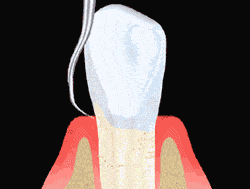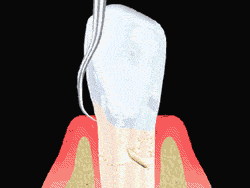Scaling & Root Planing
Treating the first stages of periodontal disease is usually a simple matter of completely cleaning the teeth, this can include root planing or scaling. The primary goal of these less invasive nonsurgical options is to remove dental plaque and tartar that cause the gingival swelling and disease. Root planing and scaling can be utilized as either a preventive measure or as a treatment. These are common tools in the fight against gingivitis and moderate to severe periodontal disease.
What do the procedures entail?
First there will be a meticulous examination of your mouth to determine your oral health, this can include x rays as well as a visual examination of your teeth. Whether or not scaling and/or root planning will be used depends on a variety of factors. The amount of tartar present, the condition of the gum tissue, progression of periodontitis, and the depth of the pockets will all factor into which treatment will be used. In some instances local anesthesia can be used during the procedure.


Scaling:
Scaling removes the tartar and plaque that has accumulated on the surface of the tooth. It specifically focuses on the area that is below the gum line, along the roots. The procedure uses a tool known as an ultrasonic scaling tool. There usually is an irrigation process that can be used to administer an antimicrobial agent under the gum line to diminish oral bacteria.
Root Planing:
Root planing aims to clear away cementum and surface dentin that is ingrained with undesirable microorganisms, tartar and toxins. The root of the tooth is smoothed promoting healing and it also works as a preventive measure against the buildup of bacteria.
Irrigation with antimicrobials and antibiotics can be used to help manage the growth of bacteria that promote periodontitis. In certain instances antibiotic fibres can be placed on the periodontal pockets after root planing or scaling. This can control an infection and promote healing.
When there are deep pockets between gums and teeth it can be very cumbersome to remove the plaque and tartar that is in them. It is very difficult for patients to keep these pockets clean. If the buildup of plaque is severe surgery may be necessary.
Benefits of Treatment
If scaling and root planing are successful in achieving their goals then there are many benefits to your oral health. To start this can prevent periodontal disease. This has been confirmed with research that has indicated that bacteria from the periodontal infections can move through the bloodstream and affect other areas of the body. These effects can reach as far as causing heart and respiratory diseases.
Another benefit to seeking treatment is protecting yourself from tooth loss. When the pockets in the gums grow deeper than 3mm there is a greater risk in periodontal disease. This is due to the fact that deeper pockets mean more bacteria can accumulate there. This causes chronic swelling which over time destroys gingival and bone tissue. This can cause tooth loss.
Root planing and scaling also help make your mouth look better and reduce uncomfortable problems like bad breath. This is because there are less food particles and bacteria that cause bad breath. Stains on the teeth can also be removed with these tools.
Martindale Dental provides both general and specialty dentistry under one roof. For more than 20 years, our dentists have been advocates for their patient’s oral health care needs.
Our dental offices are conveniently located throughout the GTA in Hamilton (Jackson Square), and St. Catharines, Ontario. We offer convenient appointments before or after work & on weekends.
Martindale Dental provides both general and specialty dentistry under one roof. For more than 20 years, our dentists have been advocates for their patient’s oral health care needs.
Our dental offices are conveniently located throughout the GTA in Hamilton (Jackson Square), and St. Catharines, Ontario. We offer convenient appointments before or after work & on weekends.
Related services
- Introduction
- Periodontal Disease
- Teeth Cleaning
- Scaling and Root Planing
- Dental Implants
- Bone Grafting
- Crown Lengthening
- Oral Cancer Exam
- Bruxism Treatment
- Bite Adjustment
- Gum Surgery
- Cosmetic Periodontal Surgery
- Guided Bone and Tissue Regeneration
- The Mouth Body Connection
- Women and Periodontal Health
- Fresh Breath Oravital Clinic
- Perioscopic Treatment
- Frenectomy
- Sinus Augmentation
- Osseus Surgery
- Pre-Operative Surgical Instructions
- Post-Operative Surgical Instructions
- Teeth In An Hour
